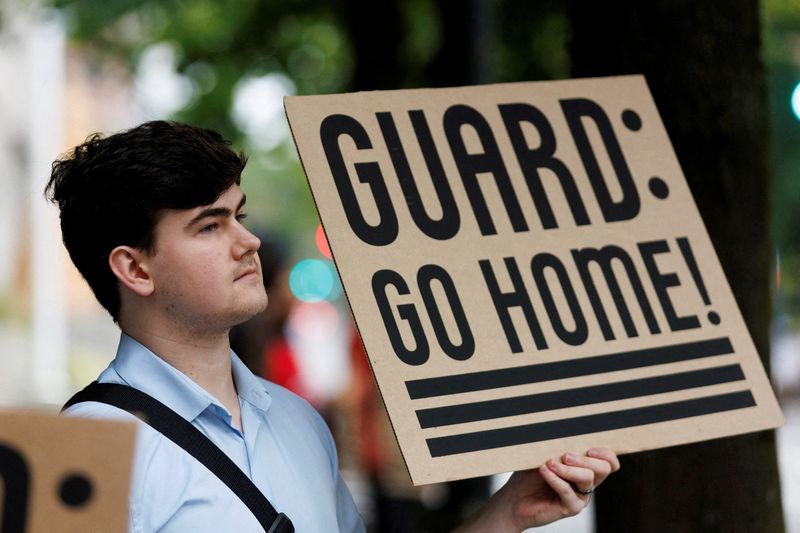By Dietrich Knauth
(Reuters) -Federal judges in Portland, Oregon and Washington, D.C. will hold hearings on Friday in legal battles over the deployment of National Guard troops to the U.S. cities, as President Donald Trump seeks to expand his rare use of the U.S. military for domestic purposes.
In Portland, Justice Department lawyers will ask U.S. District Judge Karin Immergut to lift the second of her two orders restricting Trump’s attempts to send troops to the city. This week, an appeals court ruled the president likely has the authority to do so.
In Washington, U.S. District Judge Jia Cobb will consider a challenge to Trump’s deployment of about 2,500 National Guard troops to the nation’s capital. The local government argues the Guard has improperly been serving as a “federally run police force.”
Trump has sought to deploy National Guard troops to cities run by Democratic officials, saying they are needed to protect immigration enforcement operations, suppress protests, and fight crime over the objections of local elected leaders.
Troops are on the ground in Los Angeles and Washington, D.C., and Trump has announced plans to send them to other cities, including Portland and Chicago.
States and cities have filed lawsuits to block the deployments, arguing they are based on exaggerated descriptions of crime and chaos. Courts have yet to issue final rulings on whether the actions are lawful.
JUDGE BLOCKS NATIONAL GUARD FROM PORTLAND
In Portland, Immergut on October 4 blocked Trump from taking control of Oregon’s National Guard and sending troops to Portland. The next day, after Trump attempted to circumvent that order by sending troops from California and Texas to Portland, the judge barred deployment of troops from any state, including Oregon.
A three-judge panel of the 9th U.S. Circuit Court of Appeals this week paused Immergut’s October 5 order while the court battle plays out. But troops have not yet deployed to Portland because the October 5 order remains in effect.
The Justice Department is asking Immergut to lift her October 5 order in light of the 9th Circuit’s ruling. If Immergut, who was appointed by Trump during his first term, agrees, the administration could move forward with the deployment.
Oregon has argued the three-judge 9th Circuit panel, which included two Trump-appointed judges, got it wrong. The state has asked Immergut to maintain the status quo while it appeals and has asked the 9th Circuit to reconsider the case with a larger panel of 11 judges.
State and local officials say Trump’s action violates several federal laws that govern the use of military forces as well as the states’ rights under the U.S. Constitution’s 10th Amendment.
Immergut said there was no evidence that recent protests in Portland rose to the level of a rebellion or seriously interfered with law enforcement, and said Trump’s description of the city as war-ravaged was “simply untethered to the facts.”
TROOPS DEPLOYED IN D.C.
The case before Cobb in Washington hinges in part on how to interpret the Home Rule Act, a law passed by the U.S. Congress in 1973 that gave Washington residents more control over the city’s affairs and the ability to elect a mayor and city council.
The president has more power over law enforcement in Washington than the rest of the country, because of the area’s unique status as a federal district that is not part of any state.
But local politicians in Washington have argued that no U.S. law authorizes such a “unprecedented application of military power in an American city.”
Trump has said the National Guard’s presence in Washington was necessary to “rescue” the city of 700,000 residents from a wave of lawlessness. Crime levels in Washington were falling before Trump deployed troops, according to the city’s police force.
(Reporting by Dietrich Knauth in New York; Additional reporting by Jan Wolfe in Washington; Writing by Luc Cohen, Editing by Alexia Garamfalvi and David Gregorio)


